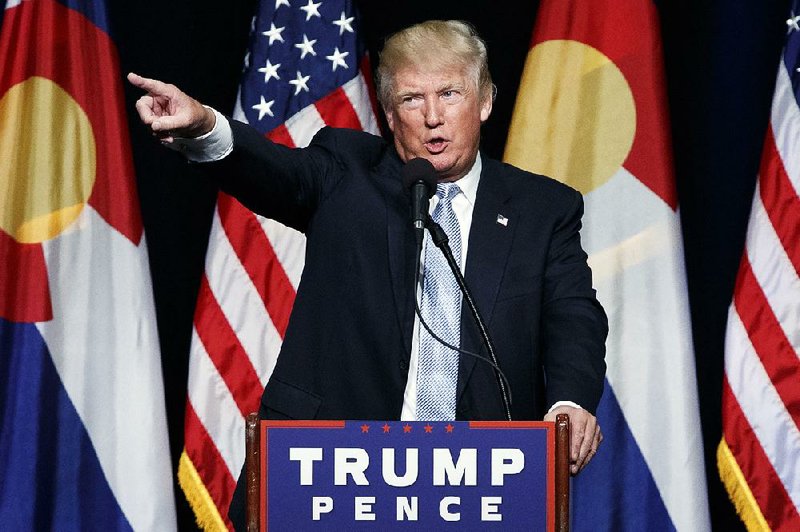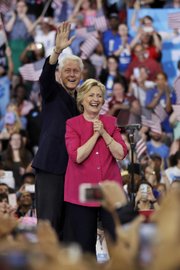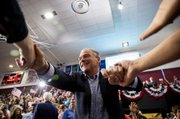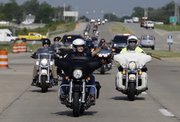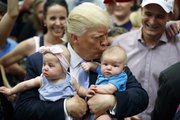PHILADELPHIA -- After a historic Democratic convention, Hillary Clinton rallied Friday to stress the "stark choice" voters will face between her and Republican nominee Donald Trump when they go to the polls in exactly 101 days.
RELATED ARTICLE
http://www.arkansas…">State's U.S. Senate rivals weigh in on parties' lots
Presidential debates
The Commission on Presidential Debates has release the following schedule of presidential and vice presidential debates:
Sept. 26 First presidential debate, Hofstra University, Hempstead, N.Y.
Oct. 4 Vice presidential debate, Longwood University, Farmville, Va.
Oct 9 Second presidential debate, Washington University, St. Louis.
Oct. 19 Third presidential debate, University of Nevada, Las Vegas.
Source: Debates.org
FULL ELECTION COVERAGE
"There's no doubt in my mind that every election is important in its own way, but I can't think of an election that was more important in my lifetime," the Democrat told thousands of supporters in the first stop of a three-day bus tour through the Rust Belt battlegrounds of Pennsylvania and Ohio.
"It's not so much that I'm on the ticket; it's because of the stark choice that's posed to Americans in this election," she said.
Trump also has targeted Ohio and Pennsylvania as states where he can make headway with blue-collar white men. That demographic has eluded Clinton and was unlikely to be swayed by a Democratic convention that heavily celebrated racial and gender diversity.
On Friday, Trump made his way west for campaign events in Colorado, telling supporters he's starting to agree with calls for his Democratic rival's incarceration.
"I've been nice," Trump said in Colorado Springs. But, he added, after the "lies" of Clinton's convention speech Thursday night, "I don't have to be so nice anymore. I'm taking the gloves off."
Later, at a rally in Denver, Trump took Clinton to task for presenting what he said was a too-positive outlook for the country. Clinton "made it sound like everything is rosy-dory," he said. "Things are not rosy-dory, folks."
In his first public appearance since the close of the Democratic convention, Trump unleashed fresh jabs at Clinton. He called her Thursday night speech, in which she became the first woman to accept a major-party presidential nomination, "so average." He also remarked that newly released television ratings found the viewership for his nomination acceptance speech was higher than that for Clinton's.
While en route to Colorado, he lashed out on Twitter at those who were critical of him at the Democratic National Convention, specifically mocking former New York Mayor Michael Bloomberg's height and claiming that John Allen, a retired four-star general, "failed badly" in the fight against the Islamic State militant group.
But the celebratory mood of this week's Democratic National Convention continued Friday as Clinton smiled and waved as she boarded her blue campaign bus, wrapped with the slogan "Stronger Together." She took the stage at her first rally with her husband, former President Bill Clinton, and running mate U.S. Sen. Tim Kaine of Virginia standing behind her.
"I stayed up really late last night. It was just hard to go to sleep," she told supporters gathered in a West Philadelphia arena, a short hop from the arena where Clinton delivered her acceptance speech Thursday night. "It was so exciting but I have to tell you it was also kind of overwhelming. I take deeply and with great humility the responsibility this campaign imposes on us."
Her more traditional campaign event was in stark contrast to the withering post-convention attack Trump delivered against U.S. Sen. Ted Cruz in which he rehashed old dramas about the Texan's wife and father.
"We might as well have been talking about two different countries," Clinton told a crowd of thousands packed inside a gymnasium. "Or, as someone said to me, two different planets."
Clinton, accompanied by Kaine and their spouses, will use her bus trip to focus on economic opportunity, diversity and national security. Democrats hammered home those themes this week with an array of politicians, celebrities, gun-violence victims, law enforcement officers and activists of all sexual preferences and races.
Their goal is to turn out the coalition of minority-group, female and young voters that twice elected President Barack Obama while offsetting expected losses among the white male voters drawn to Trump's message.
"As of tomorrow, we have 100 days to make our case to America," she said.
Democrats contrasted their optimistic, policy-laden message with the darker vision and less specific platform that marked Trump's turn during the Republican convention a week earlier.
Clinton's speech "was such a contrast with what we saw in Cleveland last week," Kaine told CNN's New Day on Friday, referring to the GOP convention. He described the Republican gathering as "dark and depressing."
Kaine said "there's still an awful lot of repair work" to be done on the economy, particularly with regard to job creation. But he insisted, "We don't have a single issue in this country that we can't tackle," and said job creation would be the top priority if Clinton wins the White House.
Convention Overview
While Democrats like Kaine generally considered Clinton's acceptance speech on Thursday night to be one of her best, Republicans offered reviews that were more mixed.
Many considered it to be a speech filled with policies they could never support, but some Republicans who still refuse to support Trump expressed remorse about the direction of their party and offered some praise for her address.
"There's a logic to this speech that is in American mainstream," said Stuart Stevens, a former adviser to Mitt Romney. "Trump was dark and outside mainstream."
The Trump campaign pushed back against Clinton's assertion that Trump was taking the Republican Party from "morning in America" to "midnight in America."
"If it's midnight in America, it's because of the 7½ years of the Obama and Clinton administration," Paul Manafort, Trump's campaign chairman, said on Fox News on Friday.
Trump, tweeting Thursday night during Clinton's remarks, said, "Same old stuff, our country needs change!"
Trump's running mate, Gov. Mike Pence of Indiana, also said Clinton offered no new ideas.
"What I heard was more, a commitment to more taxes, more regulation, more government," he said at a luncheon in Indianapolis. "More of the same failed policies that have landed our national government $19 trillion in debt."
In an interview on the Hugh Hewitt radio program, Pence lamented the personal attacks leveled by Democrats at Trump, particularly Obama labeling him a "demagogue."
"I don't think name-calling has any place in public life, and I thought that was unfortunate that the president of the United States would use a term like that," Pence said.
Trump was skewered by many of the speakers at the Democratic convention, where his business record, his combative policies and even his sanity were called into question. He clearly took it personally.
"I wanted to hit a couple of those speakers so hard," Trump said at a rally in Iowa on Thursday night. "I was going to hit one guy in particular -- a very little guy -- I was going to hit this guy so hard his head would spin."
Trump also took issue with the content and tenor of Clinton's speech, arguing that his opponent envisions a borderless U.S. where workers have no power and no security. And he was not pleased with how she characterized him.
"Crooked Hillary Clinton made up facts about me, and 'forgot' to mention the many problems of our country, in her very average scream!" Trump said.
Another Hacking
The Democratic convention was marred by the leaking of emails by hackers who accessed Democratic National Committee servers. The cyberintrusions continued Friday, as the Democratic Congressional Campaign Committee acknowledged that its computers had been hacked, an intrusion that investigators say resembles the recent cyber DNC breach.
Details were initially unclear about exactly who tapped into the computers and which information was accessed at the congressional campaign committee, which raises money and provides other assistance for Democratic House candidates. Spokesman Meredith Kelly said the committee was "the target of a cybersecurity incident" and was informed by investigators "that this is similar to other recent incidents, including the DNC breach."
Obama has said Russia was almost certainly responsible for the hack of the DNC, an assertion with which cybersecurity experts have agreed. That breach led to the release by WikiLeaks on July 22, days before the Democratic National Convention began, of 19,000 emails showing that supposedly neutral party officials were favoring Clinton over Sanders during their primary contest for the presidential nomination.
As a result of that disclosure, party chairman Rep. Debbie Wasserman Schultz, D-Fla., announced her resignation.
A federal law enforcement official said Friday that computer systems used by Clinton's campaign were accessed in the DNC hacking.
In a statement released late Friday, the FBI said that it "is aware of media reporting on cyberintrusions involving multiple political entities, and is working to determine the accuracy, nature and scope of these matters."
"The cyberthreat environment continues to evolve as cyberactors target all sectors and their data," it continued. "The FBI takes seriously any allegations of intrusions, and we will continue to hold accountable those who pose a threat in cyberspace."
It is unclear whether the reported breaches at the DNC, the Clinton campaign and the Democratic congressional committee were part of a single, coordinated attack or a series of attacks aimed at the Democrats, said the law enforcement official, who spoke on the condition of anonymity.
Kelly said the congressional campaign committee is using CrowdStrike Inc., a computer security firm based in Irvine, Calif., and is "cooperating with the federal law enforcement with respect to their ongoing investigation." She said her organization is "continuing to take steps to enhance the security of our network in the face of these recent events."
A House Democratic aide said late Thursday that the FBI is investigating the hack. The aide was not authorized to discuss an ongoing investigation and spoke on condition of anonymity.
White House deputy spokesman Eric Schultz said he is aware of the reports about hacking but referred questions to the FBI. The FBI did not immediately respond to a request for comment.
CrowdStrike issued a statement confirming its work for the congressional campaign committee but provided no additional details.
CrowdStrike and another security firm, ThreatConnect Inc. of Arlington, Va., said they found evidence pointing to Russian government involvement in the DNC hack when they analyzed the hackers' methods and efforts to distribute the stolen emails and other files. The hacker groups, identified by CrowdStrike as Cozy Bear and Fancy Bear, used different but sophisticated techniques to break into the DNC and try to avoid detection.
The congressional campaign committee's hacking was first reported by Reuters.
Information for this article was contributed by Lisa Lerer, Jonathan Lemire, Alan Fram and Darlene Superville of The Associated Press; by Alan Rappeport, Matt Flegenheimer, Nick Corasaniti and Eric Lichtblau of The New York Times; and by Melanie Mason of the Los Angeles Times.
A Section on 07/30/2016
